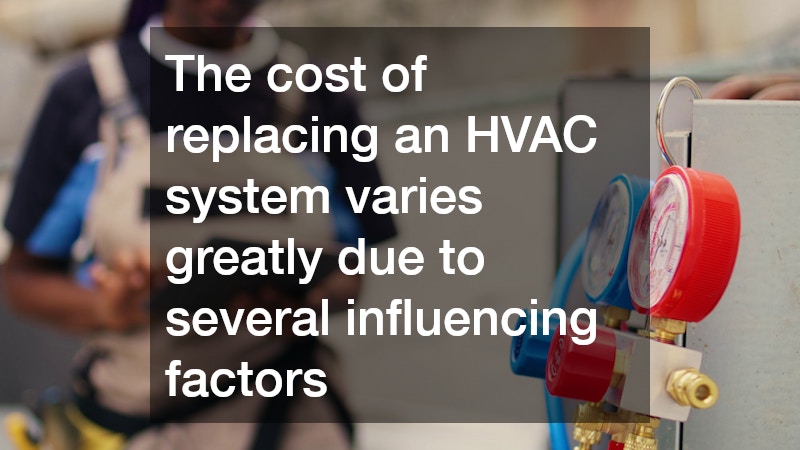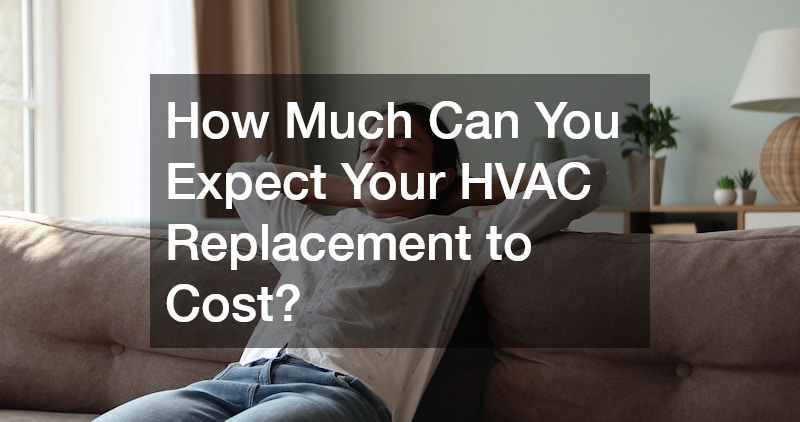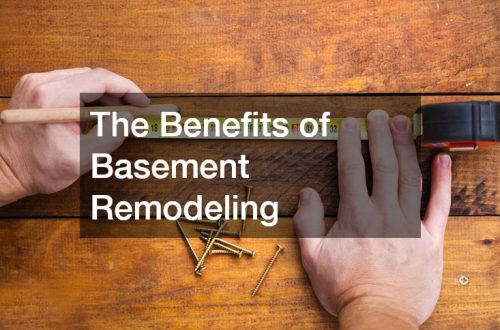
When considering an HVAC replacement, it’s important to understand what this process involves and why it might be necessary. HVAC systems, which combine heating, ventilation, and air conditioning components, are integral to maintaining comfort in your home. Over time, these systems can wear out, leading to inefficiencies and increased energy bills.
Most homeowners opt for an HVAC replacement when their system is outdated or beyond repair. This decision often stems from wanting improved energy efficiency and subsequently lower utility costs.
Before diving into costs, it’s crucial to note the factors that might lead to the necessity of an HVAC replacement. A system that frequently breaks down, struggles to maintain consistent temperatures, or results in higher energy bills indicates a need for replacement. Additionally, HVAC systems typically last between 10 to 15 years. Beyond this period, the likelihood of failure due to overuse increases significantly. Regular maintenance can prolong system life but won’t stave off replacement indefinitely.
An upgraded HVAC system not only provides better temperature control but also includes advanced technology for smart home integration. This improvement can lead to enhanced comfort management throughout the year. Homeowners might also see a decrease in energy costs, as new models are more energy-efficient than older ones. Such gains underline the importance of replacing an outdated HVAC system when necessary, helping to ensure a return on investment over time.
Factors Influencing the Cost of HVAC Replacement
The cost of replacing an HVAC system varies greatly due to several influencing factors. First and foremost, the size and type of system required for your home play a decisive role. Larger systems designed for more extensive spaces naturally incur higher costs. Geographic location also affects pricing, as labor rates and material costs can fluctuate between regions. Moreover, the complexity of the installation and the specific brand or model opted for can significantly alter the final price.
Furthermore, different contractors might quote varying prices based on their expertise and market reputation. Hiring a reputable professional, while potentially more expensive upfront, can save money in the long run through quality installation. Poor installation can lead to inefficiencies and future repair costs. It’s advisable to secure multiple quotes to get a comprehensive understanding of the market rates and services offered. Additionally, certain local and federal government programs may offer tax breaks or subsidies for energy-efficient HVAC systems, possibly offsetting some costs.
In terms of additional expenses, homeowners should consider the cost of removing the old system and any required upgrades to existing ductwork. If ductwork needs replacement or enhancement, this could add considerable cost to the project. Additionally, any unforeseen structural changes required to accommodate the new system are important factors. These supplementary costs underline the importance of thorough initial inspections and consultations. Adequately assessing these variables ensures budgeting accuracy and project feasibility.
Estimating the Overall Cost of HVAC Replacement
Overall, the average cost of a standard HVAC replacement ranges from $5,000 to $10,000. However, prices can exceed this average based on the aforementioned factors. For a high-efficiency system or a complex installation, homeowners should expect the cost to be on the higher end of the spectrum. When considering additional factors such as smart home technology integrations, costs can further increase. Therefore, obtaining a detailed quote that includes all facets of installation and expected additional costs is prudent.
Homeowners should also consider the timing of their HVAC replacement. Peak seasons, such as summer or winter, might result in higher installation costs due to the increased demand for HVAC services. Planning a replacement during off-peak times may yield potential savings. It’s also wise to factor in potential savings from improved energy efficiency and reduced energy bills when calculating overall costs. These savings can offset installation expenses over time, making initial investments worthwhile.
Another financial consideration is the warranty and maintenance plans offered by manufacturers and installers. Warranties can protect against unforeseen failures and maintenance plans ensure your new HVAC system remains in optimal condition. Typically, high-quality systems come with several years of warranty coverage, offering peace of mind. Weighing these aspects when evaluating overall costs can influence future expenditures and energy consumption. By choosing a reliable system and qualified professional, homeowners can safeguard their investment while ensuring comfort and efficiency.
Making Informed Decisions for Your HVAC Replacement
A successful HVAC replacement requires informed decision-making and thorough research. Comparing various systems and consulting with experienced professionals is key to understanding what best suits your home’s needs. When budgeting, consider all costs associated, including equipment, installation, ancillary work, and potential tax incentives. Additionally, evaluating long-term savings on utilities helps illustrate the full financial picture. Understanding these elements equips homeowners with the insights needed for making educated choices.
It’s also wise to seek references or reviews on potential contractors and manufacturers, ensuring trusted and reliable service. Personal referrals or online reviews can provide insights into the quality of work and customer satisfaction levels. Establishing clear communication with contractors can ease concerns and clarify expectations before commencing replacement work. A detailed contract that specifies work details, costs, and timelines further ensures transparency and satisfaction with the HVAC replacement process. Gathering this information promises a smooth transition and optimal outcome for HVAC upgrades.
Ultimately, the goal is a comfortable, energy-efficient home that meets present and future needs. Investing in a high-quality HVAC replacement directly contributes to this goal, offering both improved functionality and utility savings. An effective replacement enhances home comfort and value, while also reducing environmental impact through efficient operations. This investment in your home’s HVAC system pays dividends through increased comfort, lower energy bills, and prolonged system life. Making well-informed choices now sets the stage for long-term benefits and peace of mind.






